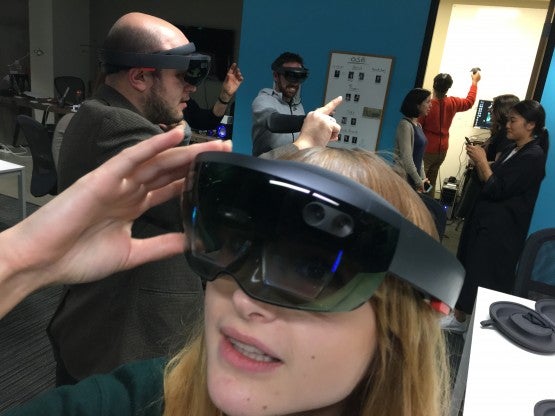Story by Richard Percy
Video by Richard Percy and Schaeffer Bonner
Along with drones and virtual reality, 360 video is one of the hottest tech trends in journalism today. So when the UO School of Journalism and Communication’s Assistant Professor Heather Shoenberger, Strategic Communications Master’s Program Director Donna Davis and Multimedia Journalism Master’s Program Co-Director Wes Pope won seed money from the Agora Journalism Center, they didn’t hesitate to put it toward the purchase of four Nikon KeyMission 360 Camera kits.
There was a catch, of course, but it was one they could live with: They would need to use the equipment to produce a public service announcement on behalf of the Pacific Rivers Council.
“First and foremost, this is a grant project, working with a community partner,” said Pope.
Rather than recording the PSA in industry-standard 1080 HD video, they would use the opportunity to test the effectiveness of 360 video in getting viewers to take action.
But Pope wanted to ensure that his students would also benefit from this partnership. What if they could achieve three goals at once: create a PSA for a nonprofit partner, conduct research into 360 video’s effectiveness and give multimedia journalism students valuable hands-on experience with an emerging medium.

The 360 shoot
Early one morning during fall term, Pope and his first 360 video class piled into a van in front of the White Stag building on Couch in downtown Portland. Their ultimate destination was Gales Creek, Oregon, where they would gather footage of clearcut areas of forest for a PSA to raise awareness about improper clearcut practices.
They decided to shoot immersive video in two forest locations: one that had been cleared using detrimental practices, and one that had been cleared with a more environmentally friendly approach. Their hypothesis for the research component of their goal: If viewers become immersed within the problem that the PSA describes, then perhaps they’ll become more empathetic and therefore more likely to act.
But the field trip also served as a crash course in some very marketable skills. In addition to the 360 cameras, students also became acquainted with the SOJC’s drone.
After enjoying a picnic lunch, Pope flew the DJI Inspire 1 through a wooded valley with one of the 360 cameras attached to its underside.
Process and product
A couple of weeks later, Pope and recent MMJ graduate Rachel Bracker led the class in editing their 360 footage in Adobe Premiere Pro. The editing session was held in the George S. Turnbull computer lab, so students could have their own computers, follow along and remain interactive.
Those who signed up for the workshop also got the chance to go to Oregon Story Board to watch an exclusive presentation about various production opportunities that are developing in Portland, as well as information about what the nonprofit is doing to attract that type of work to the area.
“I think our students got a lot out of that,” Pope said. “I know I got a lot out of the presentation.”
Whether the SOJC will offer a 360 video workshop in 2017 is still yet to be determined. But the 360 cameras (as well as the drone) will remain available for graduate students in Portland to check out and use.
Pope noted that his experiment garnered a good deal of interest, so he hopes the school will find a way to offer similar opportunities to cohorts to come.
“I think we are just on the cusp of 360 video really taking off,” he concluded. “It’s a great opportunity for our students to be ahead of the curve. I would argue that it’s one of the most relevant things we could be teaching right now.”
Richard Percy will graduate this spring with a master’s in multimedia journalism. He is a Portland-based filmmaker and writer who develops story packages for the UO School of Journalism and Communications. View samples of his work at www.richardpercy.com.
